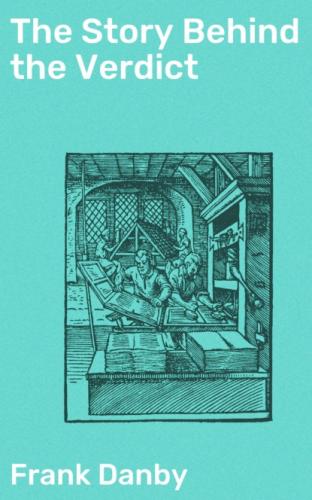Frank Danby
The Story Behind the Verdict
Published by Good Press, 2020
EAN 4064066429225
Table of Contents
The Inquest on Armand le Mesurier
INTRODUCTION
Everybody both in and out of London, Rome, Paris, and Vienna knew or knew of the Keightley Wilburs. To begin with, their relationship was peculiar. To continue, so were they. Plutocrats, yet to be counted among the intellectuals: mother and son, yet lovers and intimate companions living together in a rare and perfect sympathy. Keightley wrote plays, poems, essays, professed Socialism and practised the occult His mother dressed exquisitely, preserved her figure and complexion and played auction bridge with ardour. Each was tolerant of the other's hobbies. Their house in Carlton House Terrace, although not the largest, was certainly the most remarkable. For whilst their neighbours cherished eighteenth century masterpieces—Sir Joshuas, Romneys, Gainsboroughs, Hoppners—the Keightley Wilburs had accumulated a collection of Primitives, in comparison with which these were as interesting as modern Italian china.
Within the limited covers of one book it would be impossible to schedule, far less to describe, the valuables with which Keightley Wilbur and his mother were always surrounded, the aura in which they moved exquisitely and uniquely. There are readers however for whom such description would have but limited value, to whom humanity has a stronger and deeper appeal than tradition; individuality than the most pregnant art. And it is for these the following stories have been gathered together. They represent one short phase in the evolution of Keightley Wilbur's psychology; the psychology of a young man of genius whose preciosity was almost sincere: a young man of taste who violated it perversely and often; a young man of sentiment who spent a lifetime in disguising that which he looked upon as a weakness.
Accident led him to his adventure into criminology, the weird little god of circumstance. It is not impossible that conscience kept him where he had been led. And the end would seem to confirm the surmise.
Certain it is that, until Pierre Lamotte came to his untimely end, Keightley Wilbur knew no more of coroners' courts than of Christian Science, and was as little interested in either. But after twelve jury-men had pronounced their verdict of accidental death upon his whilom friend and guest, his attention became riveted upon these petty inquisitions, and he discovered in them during the following few months a perpetual source of wonder and surprise, a fount of inspiration, even of romance. The coroners' courts for this short period provided him with abundance of material for his literary work, with comedy as well as tragedy, and occasionally farce. The occult ceased to interest him. Socialism and Fabianism faded into insignificance. During this time he was heard perpetually asking why such a field should have been so neglected? He upbraided his journalistic friends for their supineness, urging his brother dramatists and novelists to join him in riding this new hobby.
Such an occurrence as the first related in this series could have had no similar effect on any other individual. But Keightley Wilbur was and remains different to the common run of men, and must not be judged from the ordinary standpoint.
The Case of Pierre Lamotte
CHAPTER I
THE CASE OF PIERRE LAMOTTE
Extract from a London evening paper:
"At Windsor yesterday an inquiry was opened by the coroner (Mr. Morton Bull) into the death of Pierre Lamotte, the distinguished French dramatist, whose body was discovered at an early hour on Ssiturday morning, in the rushes by the 'Bells of Ouseley.'
"Pierre Lamotte is known in England principally by L'Ingénue, an English version of which was produced by the Players' Society early in the season under the title of The Flapper. It will be remembered that considerable and somewhat acrimonious controversy ensued after this performance. Other works of his that have been translated are a volume of verse, which was well received by the critics; and a lurid romance entitled 'Half-Brothers,' immediately placed on the Index Expurgatorius of the Library Association. We understand that Mr. Lamotte was in England on the present occasion in connection with L'Ecrevisse, now staged at the Odéon, and, according to rumour, to be seen at St. James's if ever the run of Renegades shows signs of having exhausted its popularity. At present there are no such signs.
"Mr. Lamotte, during his stay in England, was the guest of Keightley Wilbur, the young literary Mæcenas of Carlton House Terrace, who, it is understood, will be called to-morrow to throw what light is possible upon the mystery of his friend's death."
At the adjourned inquest, true to newspaper anticipation, the first witness called, after the necessary formalities had been gone through, was Mr. Keighley Wilbur. The court was crowded with literary celebrities and well-known people.
After being duly sworn, Mr. Wilbur said, in answer to questions:
"I am Keightley Wilbur, of Carlton House Terrace, author of 'The Nut's Progress,' 'Love,' and other pieces. I am also a playwright, and in my leisure hours I interest myself in sociology. Mr. Pierre Lamotte was my guest, but hardly my friend."
The coroner asked a little impatiently:
"You were intimate with him?"
"I have no intimates." He added, a little sententiously, perhaps: "The great are always lonely."
It was later on mentioned in one of the illustrated papers that Mr. Wilbur gave all his evidence as if he were aware that it would be reported verbatim; he held the court as an actor the stage, or a practised Parliamentarian the floor of St. Stephen's. This same enterprising illustrated paper, publishing his photograph, showed a rather thin and mobile visage, with black hair, smoothly brushed back and super-abundant, a Jewish
